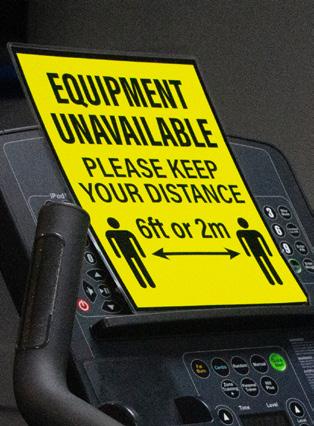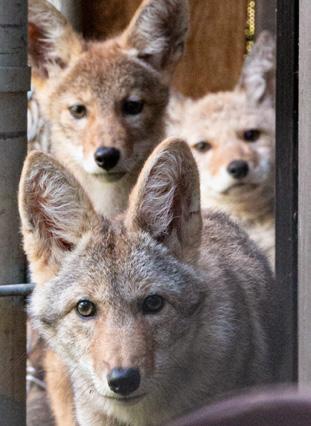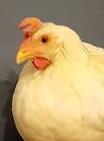Fitness restrictions

COVID-19 regulations have left students lacking in options for their physical health. P2
Coyotes in COVID
The pandemic has resulted in increased coyote sightings in Vancouver. P2

Penny the chicken
A genetically bred poultry survives her inherent health problems.

langaravoice.ca
Students feeling burnt out
Stress of remote learning leaves many drained
By MEG MCLACHLAN
Post-secondary students across the Lower Mainland say they are experiencing an increased level of burnout this year because of COVID-19.
Since classes have moved online, more students are learning without the usual coping mechanisms like socializing with friends, weekend getaways and physical exercise to help manage stress levels.
According to a survey by Toronto Science Policy Network, Canadian graduate students indicated a 72 per cent increase in the severity of mental health symptoms, including depression, anxiety and loneliness.
Tanzil Mulji, a second-year nursing student at Langara, is thankful she is not in first year. “I can't imagine trying to learn IVs or wound care … via video demonstration,” Mulji said.
Movie magic prevails
Langara's film arts students overcome COVID-19 challenges
 By TYSON BURROWS
By TYSON BURROWS
Doing their own hair and makeup. Changing scripts on the fly so that scenes would be filmed outside. Decorated in facemasks between shots.
Langara’s film art students had no idea what they were in for when classes began this semester.
As most film art classes have moved online, students and instructors had to find creative ways to complete the program under the college’s strict COVID-19 measures, while also reflecting the industry’s standards as closely as possible.
Film arts coordinator Jonas Quastel said the semester’s greatest success was the students’ ability to adapt, and said most students “fared quite well,” given the constraints of the pandemic.
When the bulk of the college moved online last March, the students had already finished their main shoots for the term.
“So, then we did all of our postproduction in very creative ways,” Quastel said, adding that COVID has
impacted the program “similar to how it impacted the industry.”
By the second term, the program was “comfortably online.”
Only production and acting classes were completed in person but following COVID protocols.
“The industry stopped for some time.
Once everything came back on, the rules of the game were clear,” said Marlene Castaños Ortega, a professional actor from Mexico, enrolled in the acting stream. “It was easy to translate into the program.”
This semester, the actors had to look after themselves completely, said Quastel. Their hair, makeup, wardrobes, props – whatever they needed was confined to “their own little box” that they had to take care of.
Masks were to be worn at all times. The only exception: actors while being filmed.
It was practically impossible to social distance on set, said Elaine Thrash, another actor in the program.
“So, they say, ‘Cut,’” she said, pulling her hands to her ears. “Put a mask on.”
At certain times, scripts were rewritten before production to allow for safer practices.
“We tried to move anything we could outdoors, because the risk of transference is reduced greatly,” Quastel said.
He felt confident in students’ job prospects after graduation, given the higher costs associated with bringing in actors from abroad, especially with the required two-week quarantine period.
“We’re getting opportunities for local actors to get cast in roles that, beforehand, would have gone to an American,” said Quastel.
Ortega said she has heard that before but has also heard that the industry had slowed.
“It’s so much uncertainty,” she said.
She was particularly worried about the impact of having less face-to-face interaction at school.
“I know I didn’t perform as well as I could have,” she said about in-person auditions. “Because I’m not used to that anymore.”
Virginia Millsap, a 2014 acting stream grad, currently works in the industry helping to formulate and implement COVID-19 policies.
Millsap said the industry is “booming” right now.
“So yeah, I wouldn’t be worried about having to get a job in the film industry.”
Thrash is hopeful coming out of the program, especially due to the challenges posed by the pandemic.
“In a real-world situation, we are ready for everything now.”
One of the hardest challenges of this school year for Mulji has been her sedentary home life. “I’m less active. I don’t have to walk across campus to get from one class to another anymore, which doesn’t seem like much but it’s a tiny moment of movement that I lack now,” Mulji said.
Yani Kong, an art history instructor at SFU, struggles to balance home life, her work and her students.
“I feel like I'm in a kind of a mild depression … I don't want to get up and do this. The monotony of life is really getting to me,” Kong said.
Kate Levesque is in the second year of her master’s degree in science and forestry at the University of Alberta. She was studying abroad in Germany when the pandemic hit and forced her to continue her study back in Canada.
“I think the imposter syndrome I feel is a result of not being physically present within the post-secondary institution. It all drains on my mental health because I am constantly feeling like I am not good enough,” said Levesque.
Both the University of Alberta and its German counterpart made many accommodations for Levesque. They reimbursed her tuition and the University of Alberta also covered the cost of her flight home in April.
One of her German professors even helped her expense the purchase of a new computer that mirrored the computer lab she left behind.
The last day of classes at Langara is Dec. 3rd with final exams beginning immediately after.
ONLINE SPECIAL
LIFE
LIFE
PRODUCED BY LANGARA JOURNALISM STUDENTS | WWW.LANGARAVOICE.CA
DEC. 3, 2020 • VOL. 54 NO. 04 • VANCOUVER, B.C.
Langara film arts student director Mark Barba filming at the Langara campus. PHOTO COURTESY OF LANGARA FILM ARTS PROGRAM
“The industry stopped for some time. Once everything came back on, the rules of the game were clear”
MARLENE CASTAÑOS ORTEGA, PROFESSIONAL ACTOR
Quiet streets greet coyotes
Urban coyote sightings may have increased as a result of less city noise
By JACOB VAN LUVEN
Some Vancouver residents believe that they are seeing more coyotes than usual in the past few weeks.
Sites like Reddit and Twitter have seen an increased amount of people sharing photos of coyotes in Vancouver.
“Yes, there is a general concept that there are more coyotes around this year than there have been in previous years,” said Maurice Jenkins, a compulsory wildlife inspector who also runs an animal trapping business.
WildSafeBC, a program designed to reduce human-wildlife conflict, said that on average, the B.C. Conservation Office Service receives approximately 1,100 coyote reporting’s a year.
According to WildSafeBC’s Wildlife Alert Reporting Program, there have been 68 reported coyote sightings in Vancouver within the last six months — of which several sightings were in South Vancouver. In the previous year, there were only 41 reports.
The BC SPCA estimates that there are between 2,000 and 3,000 urban coyotes living in the Lower Mainland. They have earned the reputation of hunting and feeding on small pets.
However, hunting is vital to our ecosystem, according to the BC SPCA, as coyotes are also a major rodent predator.
BC SPCA wildlife welfare manager Andrea Wallace said that dogs and cats are not a major part of their diet. “It’s just an opportunistic food they might come across.”
The Conservation Officer Service, a public safety provider on natural resource law enforcement, suggests being mindful of letting pets roam freely outside as they could be easy prey for coyotes.
The Conservation Officer Service said on its website “Coyotes start posing a risk to people when they lose their wariness and become comfortable around humans — this is usually a result of direct or indirect feeding by humans.”
“They generally don’t want to come into contact with people,” Wallace said. Though, if you are approached by a coyote, the BC SPCA suggests making yourself appear big and yell loudly to scare it away. It is important that you do not run as this will often cause the coyote to pursue you.
Coyotes are likely feeling bolder with the fewer people wandering the streets due to the COVID protocols. The B.C. government continues to use 2003 guidelines from a document titled Furbearer Management Guidelines, which says, “In areas where disturbance from humans is low, coyotes may show higher levels of activity during the day."
During
COVID holidays bring lonliness
Upcoming holiday season makes it harder to be social
By CAROLINE MWITTA
Since the start of COVID-19 in Jan. 2020 in B.C., measures such as gathering restriction and social isolation have made it harder for students to be social during the holiday , according to one expert.
Lidia Kemeny, a director for The Vancouver Foundation, a communityfocused non-profit said social isolation as a result of COVID-19 comes with consequences and future potential struggles of being able to interact with people.
“People are losing the scales and the capacity on how to connect to each other,” said Kemeny.
This is a learned behaviour, when we don't see a model and when we don't practice it frequently, we lose it,” said Kemeny, who was part of the “Connect & Engage” report done by Vancouver Foundation in 2017.
The report focuses on community and social trends in Vancouver,
including data on isolation and loneliness and how people interact within their community.
"There are social and emotional skills like communication, resilience and empathy, those capabilities are very important for working and living in complex environments,” said Kemeny.
The 2017 report found that 30% of people aged 18-24 reported feeling lonely “often” or “almost always”, compared to the average loneliness rate of 14% amongst all Vancouver residents.

In a more recent study conducted by Angus Reid Institute, a Canadian non-profit research foundation, 47% of Canadians aged 18-34 reported feeling “very isolated” in 2020, compared to 27% in 2019.
Raine Atkinson, a UBCO Psychology student said she feels like the current pandemic is a unique situation that is affecting young people’s ability to be social.
“The world has witnessed myriads of
tragedies,” Atkinson said. “But there have always been some safe areas where young people could meet and share social activities such as dance, sports, and parties. That is not the case with COVID-19, which is leading humanity beyond all imagination,” Atkinson continued.
She said she feels that people are socially isolated and they fear to travel.
“I cannot travel to visit my biological family on the coast,” Atkinson said. “It seems to me that social isolation will cause people to develop anxiety which will lower ability to work.”
Marwan Zeid, who is an international graduate student in management at UBC said that he has not visited his family in Iran for years because of exams and that many international students were in the same situation.
“But this summer, I did not get to visit my parents because of COVID19,” he said Zeid said that this year he was
planning to go home to Iran for the holiday, but now because of COVID19 he will be staying in B.C.
MOST AFFECTED CANADIAN STUDY (2020)
Younger Population
Ages 18-34 was feeling the most isolated during COVID (47%)
Lower Income
People with a household income of less than $50k experienced the most isolation (49%)
Job Loss
Those who lost their job are 2x more likely to report that their mental health is poor.
SOURCE: HTTP://ANGUSREID.ORG/ ISOLATION-AND-LONELINESS-COVID19/
Less fitness options impact well-being
Recent COVID-19 regulations leave less options for physical/mental health
By CAROLINE MWITTA
Recent COVID-19 gym closures and restrictions have left some students and community members with limited options for maintaining physical and mental health.
Some people have been suffering both physically and emotionally from increased time spent indoors, often as desks, combined with decreased time slots at the gym, and fewer options to exercise outside.
According to the Canadian Society for Exercise Physiology, regular physical activity can improve many aspects of mental and physical health, including cognition, cardiovascular health, stress, anxiety, and depression.
Langara student Kimberlyn Gacusan used to work out at the Langara Family YMCA. After the
gym closed, she took on biking, but she said recently she no longer worksout outdoors due to the cold.
“Now that it’s colder [outside] it’s a lot harder to exercise.”
Gacusan said without access to a gym, she feels the lack of work out equipment at her home, and the absence of peers around her.
“I don’t have all the equipment to use in comparison,” she said. “Before I had others to workout around me. [That] kind of motivates me to work out.”
Kathleen Emerson, program coor-
dinator and kinesiology instructor at Langara College, said these recent closures are likely to affect some more than others.
It’s a measure of “how long can people function before they just start to feel too much lethargy,” said Emerson.
“For some, if that's going to the fitness class is the only thing that gets (people) out the door to be active, then they might struggle more.”
Langara men's basketball player, Jas Dhuduwal, said that booking for gym time at his local recreation centre in
Surrey is trickier than before.
“I only get an hour. You can’t do too much in an hour,” Dhuduwal said.
On Nov. 7, the B.C. government announced further COVID-19 restrictions on gyms, stating that fitness centers are no longer allowed to host group physical activities.
Less than two weeks later, the government extended those restrictions from their original set date of Nov. 23 till Dec. 7, declaring that citizens must wear masks while inside all public locations, including gyms.
Emerson said those who are regular exercisers will probably find something to do because they won't be able to function well without that exercise routine.
“Because they're missing out on that,” she said. “You know the positive drug that it gives them to be doing that regular physical activity.”
2 Life&living EDITOR SAFOURA RIGI-LADIZ | THURSDAY, DEC. 03, 2020 | THE VOICE
the upcoming holiday season, there are limited options on holiday activities and gatherings due to the current regulations set in place because of COVID-19. SAFOURA RIGI-LADIZ PHOTO
“They generally don’t want to come into contact with people,”
— ANDREA WALLACE, BC SPCA WILDLIFE WELFARE MANAGER
"Because [people are] missing out on the positive drug that it gives them to be doing regular phsycial activity..."”
— KATHLEEN EMERSON, LANGARA KINESIOLOGY INSTRUCTOR




 By TYSON BURROWS
By TYSON BURROWS

